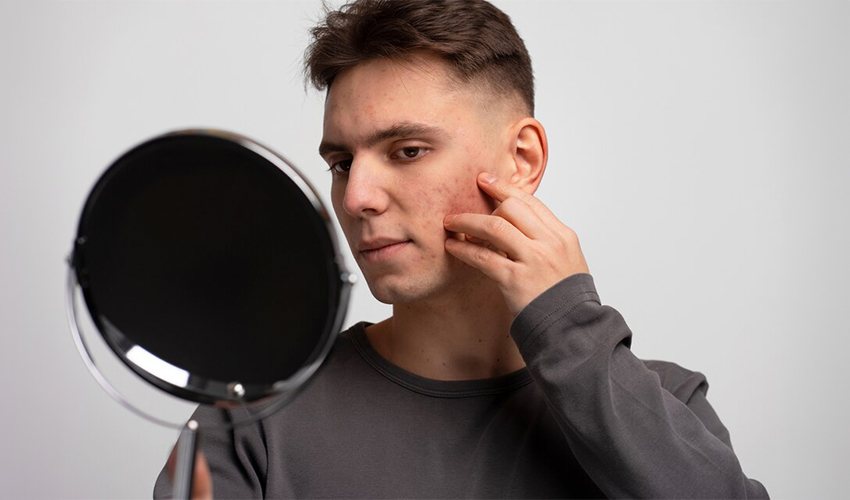Substance abuse doesn’t just impact internal organs; it also exacts a visible toll on the body’s largest organ – the skin – and the crowning glory – the hair. Delving into the dermal effects of substance abuse reveals the profound implications these habits have on one’s appearance and overall well-being.
Skin and hair health are often indicators of one’s overall well-being. They reflect the body’s internal health and vitality. Substance abuse disrupts the body’s delicate balance, manifesting in numerous ways that affect the skin’s complexion, elasticity, and the hair’s strength and appearance.
● Excessive alcohol consumption can lead to dehydration, depriving the skin and hair of essential moisture, resulting in dull, dry skin and brittle, lackluster hair.
● Alcohol can also dilate blood vessels, causing redness and flushing of the skin, especially in individuals with rosacea, a chronic skin condition causing redness and visible blood vessels, often manifested on the face.
● Smoking tobacco can accelerate the aging process of the skin, contributing to wrinkles, fine lines, and sagging.
● Additionally, it reduces blood flow, decreasing oxygen and nutrients to the skin and scalp, potentially leading to hair thinning and loss.
● Various illicit drugs can cause skin problems such as acne, rashes, or skin infections due to their impact on the immune system.
● Methamphetamine abuse, for instance, is notorious for causing severe skin issues like “meth sores,” resulting from obsessive skin picking.
● Substance abuse, such as excessive alcohol consumption and certain drug use, can disrupt hormone levels and immune function, contributing to persistent and treatment-resistant acne and blemishes.
● The chronicity of these skin conditions due to substance abuse can impact an individual’s confidence and emotional well-being, leading to frustration and the pursuit of various treatments that might not effectively address the underlying cause.
● Substance abuse, notably chronic smoking and heavy alcohol intake, accelerates the breakdown of collagen and elastin, crucial components for skin elasticity. This acceleration results in premature wrinkles, fine lines, and skin sagging, significantly altering an individual’s appearance.
● Beyond aesthetic concerns, premature aging due to substance abuse can impact an individual’s self-perception and emotional state, potentially leading to decreased self-esteem.
● Excessive alcohol consumption and smoking hinder blood circulation to the scalp, depriving hair follicles of essential nutrients and oxygen, resulting in weakened and brittle hair.
● Hair loss or thinning due to substance abuse can affect an individual’s self-image and confidence, causing emotional distress and affecting social interactions.
● Specific illicit drugs, such as methamphetamine, are associated with severe skin problems, including infections and “meth sores.”
● These sores result from compulsive skin picking or scratching due to the drug’s effects, leading to open wounds, scarring, skin infections and long-term skin damage.
The visible manifestations of substance-induced skin and hair issues transcend mere aesthetics, profoundly impacting an individual’s emotional and psychological well-being. Consider persistent acne as more than just skin deep. It’s a daily struggle, affecting self-esteem and confidence.
For instance, imagine a young professional in an urban Indian setting, striving for career success while dealing with premature aging due to excessive stress and smoking. This individual may feel trapped in a relentless battle against societal beauty standards, impacting mental health and self-perception. Similarly, in rural communities of South-East Asia, where beauty traditions are deeply rooted, hair loss due to substance abuse can be a source of shame and emotional distress. These issues often foster self-doubt, anxiety, and even social
withdrawal, emphasizing the necessity of addressing not only the physical aspects but also the emotional toll of these dermal effects.
● Embracing a holistic approach by maintaining a balanced diet rich in nutrients and antioxidants, along with regular exercise and proper hydration, not only benefits internal health but also contributes to radiant skin and healthy hair, reflecting cultural values of overall well-being.
● Seeking guidance from dermatologists or trichologists, particularly those sensitive to cultural nuances, can offer personalized advice and treatments aligned with specific skin and hair concerns related to substance abuse.
● Engaging in rehabilitation programs not only aids in overcoming substance abuse but also supports skin and hair rejuvenation. These programs incorporate holistic therapies, stress management techniques, and nutritional guidance, aligning with cultural values of a comprehensive approach to health and healing.
● Rehabilitation and wellness centers like Veda are just the perfect fit. The Veda centers provide luxury, individualized and evidence-based treatments for substance abuse that target not only detoxification and abstinence of/from substances but also provides holistic modalities like yoga, meditation, exercise. What’s more? These centers also provide one-to-one psychiatric consults and personalized diets so each person gets a tailor-made program for their specific mind and body needs.
Understanding the visible impact of substance abuse on skin and hair health sheds light on the comprehensive toll these habits exact. It emphasizes the importance of holistic well-being, encouraging individuals to prioritize a healthy lifestyle and seek support to not just restore internal health but also rejuvenate the skin and hair, contributing to an overall sense of wellness and confidence
